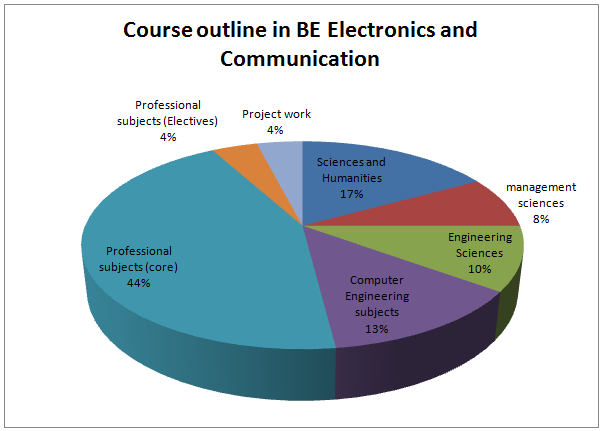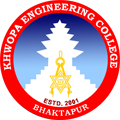- Home
- Entrance
- Study With Us
- Departments
- Sections
- Notices
- FAQs
- Contact
Introduction of Department
Formally the Bachelor in Electronics and Communications Engineering program has been structured integrally with Department of Computer and Electronics & Communication Engineering in Khwopa Engineering College in the year 2003 by the approval of Purbanchal University with an intake capacity of 48 students. The department was further bifurcated into Department of Electronics and Communication Engineering and the Department of Computer Engineering in the year 2005. The Department of Electronics and Communication Engineering came up with golden aim to meet the growing requirement of practical design engineers in the country. The department imagined, dream and create the platform for the Electronics and Communication Engineering graduates as professional engineers with strong sense of nationalism and who are highly qualified and competent in various fields of Electronics and Communication.
Since its beginning, the primary objective of the department was to impart qualitative technical education to the students with broad emphasis on design aspects of Electronics and Communication systems. The Department has always been on a high growth path and has well qualified, experienced and dedicated faculty member who work with full passion and enthusiasm to provide a energetic and optimum learning environment to the students, moreover which help them to excel in today’s competitive environment. To keep pace and shape with the current technological trends, the department has well equipped and maintained laboratories such as Communication Lab, Digital Electronics Lab, Electronics devices and Circuit Lab, Electrical Machine lab, Instrumentation Lab, Microprocessor and Microcontroller lab, Power Electronics lab etc. which gives them the necessary and sufficient backing of practical knowledge that they need. All the labs are fully equipped to meet the academic curriculum and the present day technology. The infrastructure and lab facilities are upgraded from time to time and provide adequate opportunities for students to learn and innovate. Engineering education is technical education so only theoretical knowledge is not sufficient for students. So to provide technical and practical knowledge, the department conducts field visits, educational excursion for the students to different industries. Visits to industry and conducting guest lectures by well-known professional expertise add another dimension to the teaching learning experience. Technical exhibitions and workshops are also conducted to provide exposure into real time applications. The department not only imparts training in technical skills, it also tries to cultivate ethical values among the students. Students are also encouraged to participate in co-curricular and extracurricular activities, which are so crucial in developing their soft skills and boosting confidence levels. To enhance practical knowledge on the subject matter College has established good platform for Robotics. Our students also participate in different national competitions and had achieved outstanding position on those Competitions. College secured and stood first position on 6th National Robot Contest and stood 2nd runner of in 3rd and 5th National Robot Contest organized by Robotics club of IOE, Pulchwok Campus. Similarly college secured 1st runner up in National Robotics Competition, YANTRA3.0 organized by Robotics Association of Nepal (RAN).
About Electronics and Communication Engineering
The word electronics is derived from electron mechanics, which means the study of the behavior of an electron under different conditions of externally applied fields. Electronics can also be defined as physics of electrons and their utilization. It is the study of how electrons behave and how they can be controlled so that they can do useful jobs. Electronics can also be referred to as ‘the field of science and engineering, which deals with electronic devices and their utilization’. An electronic device is a device in which conduction takes place by the movement of electrons through vacuum, gas or semiconductor.
A tiny electronic component requires very minute power in the range of milliwatts or microwatts to function, but it can control or do works involving kilowatts or megawatts of power. Thus, it is not surprising to find the fundamentals of electronics being the core subject in all branches of engineering nowadays.
Nearly all the machines we use in our everyday lives from radios, calculators and television remote controls to telephones, computers and cars contain electronic circuits that make them work. Electronics is the backbone of information technology and communications. Although each of these areas represents a remarkable advance in technology, underlying the field of electronics are basically the general principles of electricity. All the applications of electronics make use of the fundamental laws of electricity and magnetism.
The study of electronics began at the end of the nineteenth century and had its first practical use in the early twentieth century in the development of radio communications. The first electronic devices were called thermionic valves. These included the diode valve, which allowed the flow of current in one direction but not in the other and triode in which a small current could be used to control a much larger current. These valves were either vacuum type or gas filled. In 1950s, semiconductor devices quickly replaced valves.
The invention of semiconductor transistor revolutionized every field of human life. Compared to the conventional tubes, these semiconductor devices are very compact, simple, more reliable and efficient. Since the size of the components reduced to a very large extent, electronic circuits were fabricated on Printed Circuit Boards (PCBs), which are very small and simple. The semiconductor devices are mounted on the board and the interconnections between the components are established easily by etching the conducting tracks on the board. These electronic circuits are very compact and are capable of doing almost any job.
The development of the Integrated Circuits (ICs) made electronics occupy all possible fields in domestic, industrial, medical and defence applications. An IC is an electronic circuit that is much more compact compared to PCB circuits in that the components as well as the total circuits are fabricated on a single substrate. Very complex circuits could be fabricated on a single simple substrate, reducing the size of the electronic circuits to microscopic level. The growth of the IC fabrication techniques is tremendously high—these days millions of transistors are fabricated on to a single microscopic-sized IC. With these drastic developmental changes in IC fabrication, the growth of IC applications is extremely rapid and has occupied all walks of life. Ultra-high-speed electronic devices were possible due to miniature-sized components. The speed with which an electronic gadget can operate is of the order of gigacycles per second. This tremendous speed of operation has enabled the electronic engineer to devise new gadgets to meet all possible human requirements. These minute electronic components can control extremely large cargo ships at sea, gigantic steel mills, small robots and so on. It is no wonder today that these tiny electronic components do the most wondrous things in this wonderful world of ours. The evolution of digital logic and digital electronics is the basic boost to the developments in the fields of computer science, information technology, communications and allied fields.
Electronics and communication engineering is an engineering discipline which uses the scientific knowledge of the behavior and effects of electrons to develop components, devices, systems, or equipment that uses electricity as part of its driving force.
Electronics engineering is an engineering discipline where non-linear and active electrical components such as electron tubes, and semiconductor devices, especially transistors, diodes and integrated circuits, are utilized to design electronic circuits, devices and systems, typically also including passive electrical components and based on printed circuit boards. The term denotes a broad engineering field that covers important subfields such as analog electronics, digital electronics, consumer electronics, embedded systems and power electronics. Electronics engineering deals with implementation of applications, principles and algorithms developed within many related fields, for example solid-state physics, radio engineering, telecommunications, control systems, signal processing, systems engineering, computer engineering, instrumentation engineering, electric power control, robotics, and many others.
Electronics & Communication Engineering deals with the electronic devices, circuits, communication equipments like transmitter, receiver, integrated circuits (IC). It also deals with basic electronics, analog and digital transmission & reception of data, voice and video (Example AM, FM, DTH), microprocessors, satellite communication, microwave engineering, antennae and wave progression. It aims to deepen the knowledge and skills of the students on the basic concepts and theories that will equip them in their professional work involving analysis, systems implementation, operation, production, and maintenance of the various applications in the field of Electronics and Communications Engineering.
Every industry, institution & organization feels the need for an Electronics Engineer. Today’s world is very much for and of the Electronics & Communication Engineers. Advanced countries in the world have gone to such depths of Electronics today that an Electronics Engineer is indispensable in every front. Electronics and Communication Engineering is now a part of our every day life, from our pocket FM radio to televisions, computers, mobile phones and even the high-end satellites that process and send images.
Outline of the course structure:
Electronics & Communication Engineering deals with the electronic devices, circuits, communication equipments like transmitter, receiver, integrated circuits (IC). The basic principles and performance of electronic devices and circuits are introduced in the course. Design and analysis of different analog and digital circuits are considered in detail. Different analog and digital modulation techniques used for communication, equipments and systems involved in wireless communications, satellite and optical communication technologies, computer communication and networking, design and development of microelectronic circuits for computation and processing, components and systems for electronic instrumentation and control, Signal & System, Digital signal processing, microwave engineering, antennae and wave progression etc,. form major content of the course. The course also covers the study of hardware and interfacing of computer systems, programming skills and application of computers in signal processing and communication.
The course aims to enhance the knowledge and skills of the students on the basic concepts and theories aspect that will equipped them in their professional work which involving analysis, systems implementation, operation, production, and maintenance of the various applications in the field of Electronics and Communications Engineering.
Total 48 Engineering Related subjects has been teaching in BE Electronics and Communication Engineering. Those subjects are categorized as Basic Sciences, Humanities and management sciences(25%), Engineering Sciences (10%), Computer Engineering subjects(13%), Professional subjects (core) (44%), Professional subjects (Electives) (4%) & Project work (4%).

Students who wish to pursue a career in Electronics and Communication Engineering need an analytical mind, strong problem-solving abilities, sound mathematical and scientific foundation (in both math and science), and a strong desire to be in constant pursuit of knowledge. These qualities are required for success in any field of engineering, and especially in the Electronics and Communication field.
There is no upcoming events.
Any Problem? Contact Us or Visit College's Help Desk.
Your are encouraged to visit college and feel the environment.
